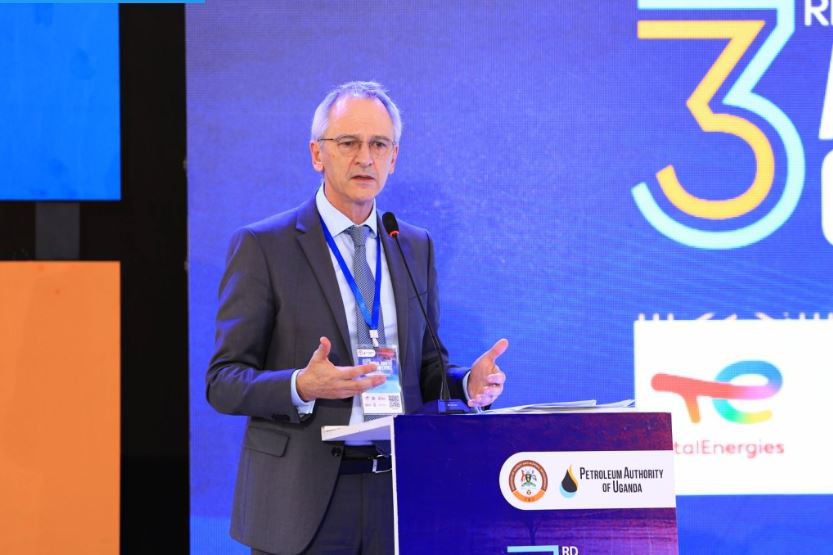
In a significant move, Union Investment, one of the world’s top 20 global investors, has decided to remove TotalEnergies from its sustainable investment funds.
This decision follows serious allegations related to human rights abuses linked to TotalEnergies’ East African Crude Oil Pipeline (EACOP) project in Uganda.
The oil pipeline project, which has long been at the centre of controversy, has now sparked widespread scrutiny regarding environmental, social, and governance (ESG) issues within investment circles.
Union Investment’s removal of TotalEnergies from its sustainable funds sets a precedent for how investors may approach corporate responsibility, especially when human rights concerns are at the heart of their business operations.
The Allegations: Forced Evictions and Human Rights Violations
The controversy surrounding TotalEnergies and its involvement in the EACOP project is far from new. Recently, a report by Just Finance International (JFI) detailed multiple human rights violations tied to the project, particularly around the Kingfisher oil site in Uganda.
During more than two years, JFI interviewed over 40 individuals, uncovering stories of forced evictions, extortion by security forces, and violent assaults on women.
The allegations point to a wider pattern of disregard for local communities’ rights as the oil extraction activities disrupt their homes and livelihoods. These reports shed light on the real-world consequences that accompany large-scale infrastructure projects, particularly in regions with weak legal protections.
Union Investment’s Response: Taking a Stand on Human Rights
Union Investment, which had previously held approximately €50 million in TotalEnergies‘ sustainable funds, made the bold decision to remove the oil giant from its investment portfolios.
The company, which continues to hold about €900 million in other TotalEnergies-related funds, made this move after the JFI report highlighted significant human rights concerns.
Union Investment is now calling for a comprehensive and independent human rights audit of the EACOP project. The firm also urges TotalEnergies to increase transparency and accountability, emphasising the importance of responsible corporate practices in ESG investments.
Raising ESG Concerns
Union Investment’s decision represents a growing movement among investors to reconsider their involvement with companies whose operations may violate fundamental human rights or environmental standards.
With ESG concerns becoming a major factor in investment decisions, the pressure on corporations to align their practices with socially responsible standards has never been higher.
TotalEnergies’ Response: Pledging Internal Review and Transparency
In response to the allegations and Union Investment’s decision, TotalEnergies has vowed to address the concerns raised.
The company has committed to publishing an internal report on the EACOP project in 2025. While TotalEnergies has attempted to downplay the claims as misconceptions, the growing international pressure, including a call from UN Special Rapporteur Michel Forst, indicates that the company cannot afford to ignore these issues.
Forst, in his statement, emphasised that TotalEnergies, which in Uganda is headed by Philippe Groueix as the Country Manager, has an obligation to safeguard the rights of environmental defenders involved in the EACOP project.
He criticised the company’s dismissal of the allegations and highlighted the importance of adhering to international conventions, such as the Aarhus Convention, which protects the rights of individuals advocating for environmental issues.
Forst’s comments underscore the broader geopolitical and legal implications for TotalEnergies, especially as global human rights defenders and international watchdogs turn their attention to the project.
The Global Impact of ESG Scrutiny
The decision by Union Investment signals a major shift in the investment landscape. As global investors increasingly prioritise ESG factors in their decision-making processes, corporations like TotalEnergies are facing heightened scrutiny over their operations and the impact they have on local communities and the environment.
This growing focus on human rights in investment strategies is shaping a new standard for corporate accountability, pushing companies to reconsider how their projects affect vulnerable populations.
Moreover, the ongoing controversy serves as a reminder of the complexities involved in large-scale energy projects, particularly in developing regions. While such projects may offer significant economic benefits, they also come with risks related to environmental degradation, human rights violations, and social unrest.
The case of TotalEnergies’ EACOP project highlights the need for robust due diligence, transparency, and respect for local communities’ rights as a prerequisite for engaging in such high-stakes ventures.
A Call for Accountability and Change
As we move toward an era of increased corporate responsibility and transparency, Union Investment’s decision to remove TotalEnergies from its sustainable funds is a powerful statement about the need for companies to uphold ethical standards in all aspects of their operations.
The growing pressure on TotalEnergies and other corporations involved in controversial projects is not just a financial matter but a moral one. Investors, activists, and global citizens alike are calling for greater accountability, with human rights and environmental considerations at the forefront of the conversation.
With TotalEnergies pledging to review its practices and engage in greater transparency, this case marks a crucial juncture for corporate responsibility.
It serves as a warning to companies and investors that ESG considerations are not optional; they are imperative for long-term success in today’s globalised, ethically-conscious marketplace.
The removal of TotalEnergies from Union Investment’s sustainable funds is just one example of how global investors are reshaping the future of business practices; one that is more sustainable, equitable, and accountable to the communities it serves.
